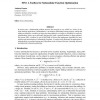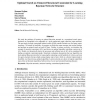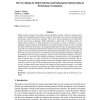109
click to vote
JMLR
2010
14 years 7 months ago
2010
In this paper, we present an overview of generalized expectation criteria (GE), a simple, robust, scalable method for semi-supervised training using weakly-labeled data. GE fits m...
104
Voted
JMLR
2010
14 years 7 months ago
2010
Much recent research has been devoted to learning algorithms for deep architectures such as Deep Belief Networks and stacks of auto-encoder variants, with impressive results obtai...
120
click to vote
JMLR
2010
14 years 7 months ago
2010
In recent years, a fundamental problem structure has emerged as very useful in a variety of machine learning applications: Submodularity is an intuitive diminishing returns proper...
110
Voted
JMLR
2010
14 years 7 months ago
2010
We present a general method for explaining individual predictions of classification models. The method is based on fundamental concepts from coalitional game theory and prediction...
JMLR
2010
14 years 7 months ago
2010
In this paper, we present an open source Error-Correcting Output Codes (ECOC) library. The ECOC framework is a powerful tool to deal with multi-class categorization problems. This...
127
Voted
JMLR
2010
14 years 7 months ago
2010
Actor-Critic based approaches were among the first to address reinforcement learning in a general setting. Recently, these algorithms have gained renewed interest due to their gen...
164
Voted
JMLR
2010
14 years 7 months ago
2010
We address instance-based learning from a perceptual organization standpoint and present methods for dimensionality estimation, manifold learning and function approximation. Under...
105
click to vote
JMLR
2010
14 years 7 months ago
2010
We study the problem of learning an optimal Bayesian network in a constrained search space; skeletons are compelled to be subgraphs of a given undirected graph called the super-st...
96
Voted
JMLR
2010
14 years 7 months ago
2010
Model selection strategies for machine learning algorithms typically involve the numerical optimisation of an appropriate model selection criterion, often based on an estimator of...
85
Voted
JMLR
2010
14 years 11 months ago
2010
Maximum entropy (Maxent) is useful in natural language processing and many other areas. Iterative scaling (IS) methods are one of the most popular approaches to solve Maxent. With...




